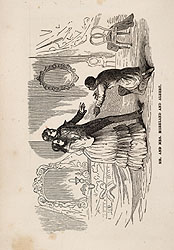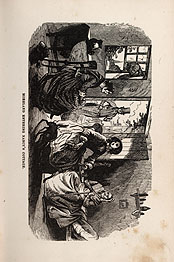
CLICK TO ENLARGE

|
". . . the negroes of the south are the happiest labouring class on the face of the globe." |
|
Like Stowe, Caroline Lee Hentz was born in Massachusetts and moved to
Cincinnati in 1832. But from there Hentz' life took her south, to Kentucky,
North Carolina, Alabama and Florida. It was as a southern writer that she
became popular with a national audience: by 1854 she had published almost a
dozen fictions, most set in the South. The Planter's Northern Bride was
the first of her novels to directly address the existence and question of
slavery: although she does not mention Stowe or Uncle Tom's Cabin by
name, her deeply-felt need to defend the white southern status quo makes her a
very partisan writer. The novel's planter's name is Moreland; his bride, Eulalia, is the daughter of a New
England abolitionist. If Stowe's Ophelia travels south to discover her prejudices against blacks, Eulalia's
experiences on her husband's plantation make her realize how wrong her father had been to condemn slavery. In
addition to the typical anti-Tom emphases on the sacrifices masters make for the happiness of their slaves and
the unhappiness of runaway slaves who have been beguiled by manipulative abolitionists, the plot includes a
planned slave uprising. The book received favorable NOTICES from northern reviewers, and was republished at least several times during the rest of the 19th century. (Philadelphia: T. D. Peterson, 1854) |
 CLICK TO ENLARGE  |
|
| This electronic text was created for the DOCUMENTING THE AMERICAN SOUTH online archive, and is the property of the University of North Carolina at Chapel Hill. It may be used freely by individuals for research, teaching and personal use as long as this statement of availability is included in the text. |
